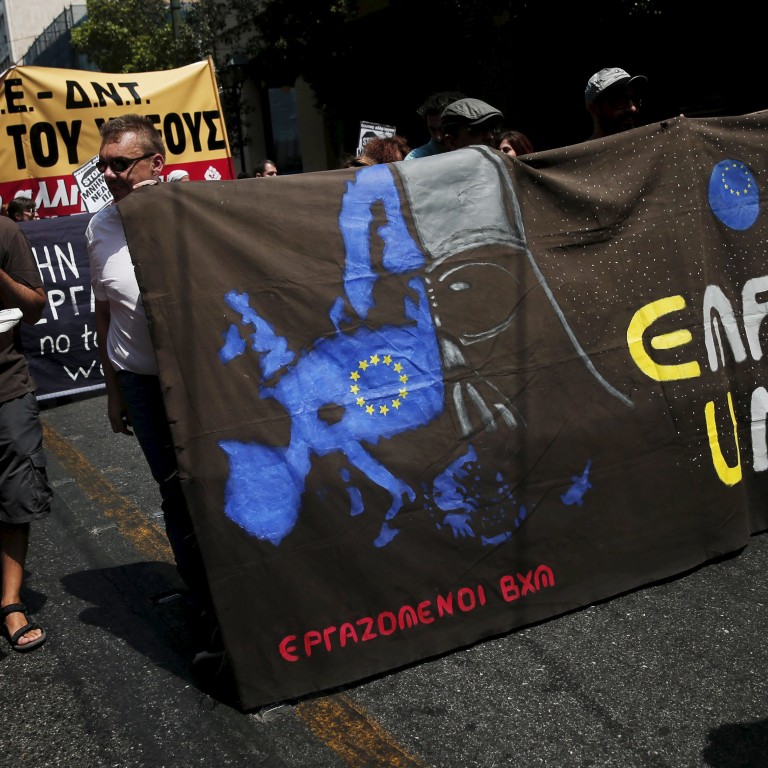
Euro currency is fatally flawed and its endgame has already started
After act of self-preservation with Greece bailout that leaves the country facing years of austerity, it's only a matter of time before the next disaster
The euro has been badly holed beneath the waterline in recent years thanks to the Greek crisis.
Euro zone policymakers might have temporarily plugged the leak with the latest Greek bailout package, but it is no more than rearranging deckchairs on the Titanic. The single currency has been fatally damaged and it risks sinking without trace over the future.
Europe came very close to catastrophe last week as the talks between Greece and its creditors for a new bailout deal almost collapsed. The bailout that was finally hammered out was not a selfless act of generosity by the European community, but a selfish act of self-protection to save the euro. If Greece had failed, the single currency would now be struggling for survival.
What Greece has been left with from the deal is eviscerating austerity for years to come. Greece might have been spared a worse fate of painful debt default, economic collapse and humanitarian disaster had it been ejected from the euro.
The crisis was not the cause but the effect of deeper flaws in the euro zone. Euro zone policymakers have been masking these failings for years. Recession prone and blighted by lacklustre recovery, high unemployment and deflation, the euro zone economy has been struggling for years.
For countries like Greece, hit by depression and corseted by extremely restrictive austerity policies and debt deflation, membership of the single currency has been a never-ending nightmare. The bailout might have given Greece some short-term breathing space, but the odds are that much of the money owed by the nation will never be repaid. It was no surprise that many Greeks were seeking salvation in the drachma's return.
Even the International Monetary Fund warned that Greece needs much more breathing space with debt write-downs and restructuring. The European Union has simply postponed chaos only for a couple more years. Greece will not lie down quietly. The risk of copycat debt repudiation and austerity rejection in other hard-pressed euro zone economies remains a very high possibility.
European monetary union, the euro zone and the euro were supposed to have united Europe into closer economic accord. Instead, since 1999, there has been deepening economic discord and greater wealth inequality.
Political disharmony has become much more acute thanks to the widening economic gulf between the prosperous north and the less well off nations in the south. The 19-member euro zone bloc seems to have descended into fractious infighting. And what was really concerning at the darkest moment of last week's crisis were botched German proposals that Greece should leave the euro for the next five years. This was not a good omen for future unity.
National self-interest is the real reason why the euro zone will never function effectively and why the euro will forever remain a flawed currency. Full economic, trade and monetary union can only work properly when it is backed up by full fiscal union to aid a fairer distribution of wealth, investment and productive capacity throughout the euro bloc. Germany has always been opposed to fiscal transfers to the less well-off euro zone economies, balking at the potential cost to German taxpayers.
For similar reasons, Germany has steadfastly stonewalled the notion of common euro government bonds. These would have been vital to help thwart speculative attacks on the distressed euro zone financial markets and could have stopped the rises in government bond yields at the height of the 2011-12 European crisis.
Something has to change for the benefit of all countries soon. While Germany monopolises the euro zone free market and gets richer and the distressed, austerity-bound nations get relatively poorer, the odds for future failure of the single currency can only rise.
It is going to take strong leadership and a massive change of heart for things to change, especially in Germany. Sadly the rise of national self-interest is getting stronger. While this is the case, the euro can be nothing more than a doomed currency waiting for the next major disaster to strike.
Greece is lurking dangerously in the wings and it is only a matter of time before a break below parity beckons for the euro/dollar exchange rate.

